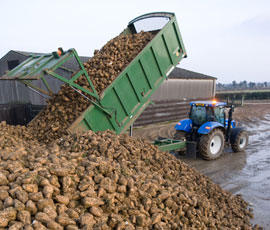Beet crop has improved after slow start

The 2012 sugar beet crop has almost recovered from a difficult beginning to the growing season, according to first estimates ahead of the start of the lifting campaign on 20 September.
After the cold, wet spring, the crop is now on a par with where it should be, Colin MacEwan, head of the British Beet Research Organisation, told Farmers Weekly.
But yields are unlikely to hit the highs of last year’s crop.
“Last year was an exceptionally good campaign, so with the conditions that we have had this year we can’t expect a repeat,” Mr MacEwan said.
“This recent spell of [warm sunny] weather has done wonders and will be giving sugar levels a much needed boost,” he said.
Even so, Norfolk grower Mark Means expected his beet crop’s sugar levels to be 1-1.5% down on the average. “Root weight is extremely variable too,” said Mr Means.
“Crops are looking a little washed out in places with pale green or yellowish leaves, and after having about 70% of our average rainfall from April to July it isn’t surprising.
“I would say that nitrogen has been washed down the profile and stunted root systems are struggling to pick it up.”
Mr Means, who manages around 200ha of sugar beet, has seen further negative effects of the wet weather on his beet area. “It has been very unusual, but where there is the slightest depression on largely flat fields there are some small and stunted roots.
“The only explanation we can think of is that the plants have drowned,” he explained.
“On a positive note we have had no disease issues this season and two fungicide sprays have been sufficient. Bolters have been a problem on the earlier sown crops, but they have been rogued twice.”
In Nottinghamshire, Farmers Weekly barometer grower Graham McIntyre painted a similar picture, with no expectation of scaling the height of 2011 yields.
“Our crops never really met in the rows, but it is surprising that there is more bottom to the crop than you would expect if you were judging by the canopy, so I’m hoping that we might get 70t/ha,” he said.
“With the late grain harvest and the smaller crop I can’t see us starting our beet harvest until late October or November to give it the best chance to build yield.
“The dilemma we have now though is whether to irrigate, especially if the current dry spell continues,” Mr McIntyre said.
Ground conditions could be a concern for some, particularly on heavier land, but Mr Means remains optimistic. “It’s not like a wheat crop which dies off. Beet keeps on growing and drawing up water so I certainly don’t think it will be a quagmire.”

